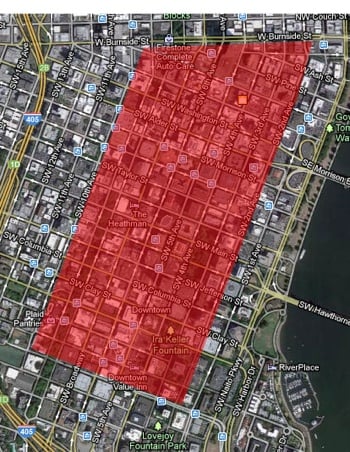
Alliance affiliate, opposes parklets in the downtown core.
(Photo © J. Maus/BikePortland)
After a successful pilot program last summer, the Portland Bureau of Transportation (PBOT) recently announced an update of their Street Seats program. While the newly proposed guidelines show the scope of the program has broadened, a group that represents downtown businesses successfully lobbied to prevent the conversion of parking spots in the downtown core.
The Streets Seats program allows business owners and non-profits to convert public parking spaces into seating and patio space. For restaurants this means more dining tables, and for non-food establishments the program is an opportunity to use space for something other than private vehicle storage. In a PBOT survey published in January, 90% of businesses said Street Seats were good for their business and 80% of survey respondents said the program has a positive impact on street vitality.
The Portland Business Alliance (PBA), on the other hand, opposes the program. The Downtown Retail Council (DRC) — a PBA affiliate group who says they’re “the voice for downtown Portland’s consumer business” — successfully stopped the City from accepting applications for new Street Seats in the area between W Burnside St., SW Harrison St., SW 10th Ave. and SW 2nd Ave (see map below).

In an editorial published today, The Oregonian Editorial Board used this concern from the PBA to help make their case against the program. They argue that Street Seats are a sign of “mission creep” from PBOT and that we should not give up precious parking spaces for non-parking uses.
Why does the DRC oppose Street Seats? The answer lies in a memo to PBOT written on PBA letterhead and dated November 14th, 2012. In the memo (PDF), the DRC says they oppose the program because it “creates access, safety, and equity challenges in the downtown.”
Here’s more from the memo (emphases mine):
We appreciate the city’s to find ways to enhance street vitality and support businesses. However, given the limited supply of downtown on-street parking and right-of-way access, as well as the density of diverse uses that downtown serves, the DRC belives [sic] the Street Seats program would negatively impact the overall business environment. Specifically, Street Seats could negative affect business vitality by reducing the shared resource of on-street parking and loading zones, which causes equity disparities by enhancing some businesses to the detriment of others’ access. The DRC also is concerned with the safety issue of conflicts between patrons and vehicles, given that the Street Seats are adjacent to the travel lane and without buffer.
In the memo, the DRC went further and made specific recommendations on how they feel PBOT should manage not just Street Seats, but any “competing uses in the right-of-way”:
1) Protecting access should be the first priority; converting on-street metered parking spots and loading zones for non-auto parking use should be avoided… A no net loss policy of parking spaces and loading zones in the central city should be implemented. For areas that have on-street parking occupancy rates at 80 percent or higher during peak times, no on-street parking conversion should occur.
2) For areas that are outside of an 80 percent or higher parking occupancy rate, the following criteria should be applied:
… f. Street Seats should not be permitted on blocks where on-street parking has previously been removed for bike corrals or bike rental kiosks [bike share stations].
The DRC lists 57 members on their website including Travel Portland, Nordstrom, PBOT, TriMet, The Portland Art Museum, Columbia Sportswear, Macy’s, Powell’s Books and many others. (UPDATE, 4/17: The Portland Art Museum says they do not oppose the Street Seats program)
This memo shows that the Portland Business Alliance will not take any change in the allocation of roadway space lightly. Their concerns are sure to play a role in future discussions about the location of bike share stations, on-street bike parking corrals, protected bike lanes, and more. How large a role they play will be entirely up to PBOT, City Hall, and whether or not other interest groups make their perspectives known.

